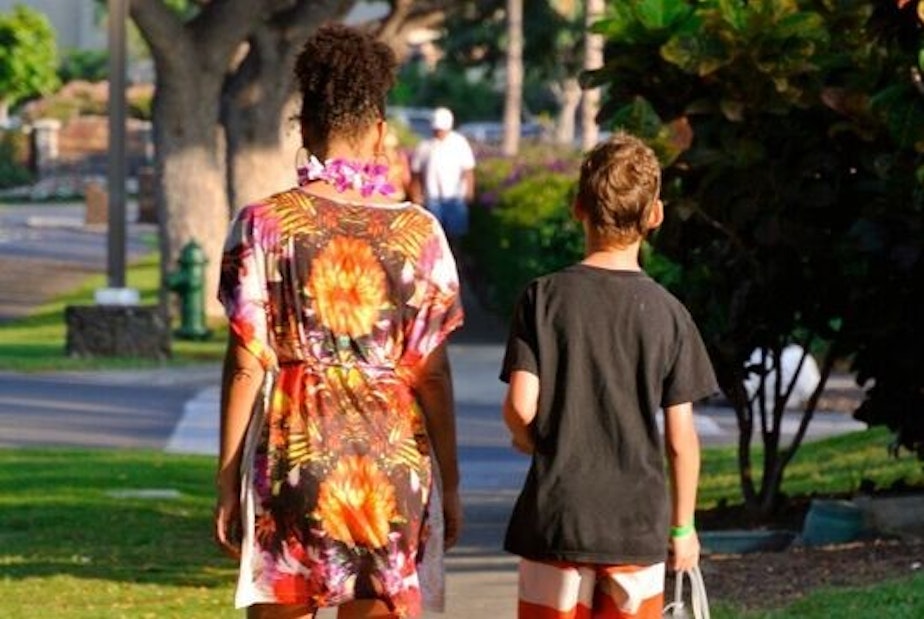Sober for 27 years. Now her son is experimenting with drugs

When Adina was 15 years old, she started trying drugs. Not just weed and alcohol but molly, LSD, and once, crack.
"I was living this other lifestyle," she said. "I started doing drugs and then I ran away. I didn't finish school, and things went off the rails. My parents were very frustrated and upset and scared."
Editor’s note: Names have been changed to protect the privacy of a minor.
She was in an abusive relationship, and her partner was beating her: "It was like, what had happened to the life that I had?"
Eventually, she realized this was not the life she wanted.
"I felt like I had to get a grip," she said, "which entailed me not doing drugs. But the drinking went on."
Her drinking kept getting worse. Finally, she quit drinking when she was 21 years old.
Adina has been proudly sober for 27 years, and she has spent much of her life working in drug addiction related fields.
She now has a family, including a dog and her 16-year-old son Ruben. He's a homebody who has enjoyed being around his parents and never hesitated to tell his mom about his life, until he started using drugs.
"In the beginning," Ruben said, "I viewed my drug use as a good thing, like an addition to my life."
Adina noticed a change in their relationship. Ruben became moody, starting kept secrets, and began struggling with depression and anxiety. Soon, she found evidence of drug use.
Like her, he was not just using weed and alcohol. He was taking prescription painkillers and taking them alone in the house.
"It was very alarming," Adina said. "I thought, what's going on? Are you trying to hurt yourself, or are you trying to self-medicate?"
She didn't want her son to fall into the lifestyle she once had.
"I can imagine the path that I walked on," she said, "and I want to say, don't take this path! Just don't go down this path. It's not worth it.
"When you become a parent, it's like all of a sudden your heart's living outside of your body. It's the craziest feeling because you feel like, there's this person I just want to protect no matter what."
This concern doesn't always manifest itself the way a parent wants it to.
"I wish my mom had not projected herself so much onto me," Ruben said. "She would always tell me, 'I understand, I understand.' Great, you understand, but do you really know what you're doing?"
It hasn't been easy, but Adina has learned the necessity of boundaries.
"I can do the most good by having very clear boundaries, by actually enforcing boundaries," she said, "but not doing it in a way that's antagonizing or mean or controlling or judgmental. Just to say, I love you, here are the boundaries."
For Adina, these boundaries include forbidding drug use in the house and asking her son to check in with her before inviting someone over.
Adina stresses that one of the most important things a parent can do is take care of themselves first.
"I can't say enough about support and not trying to do things alone," she said, "because it is really scary. I've learned a lot about being gentle with myself and understanding it's always a learning process."
She's found that staying calm and open has been a successful way to get her son to be truthful when it's most needed.
"If it does come down to something kind of scary, he'll tell me," she said. "He's pretty much told me, in the end, almost every time. He'll be like, okay, I have to tell you this happened, and I really am afraid."
Adina emphasizes the importance of not losing hope.
"I have to remember, oh yeah, hope!" she said. "Sometimes things can look awful, but it doesn't mean that the person isn't learning and growing and changing.
"The hardest thing is to watch our kids make mistakes and cause themselves pain. But that's how they learn, grow, become adults, and make their own choices in life."
As Ruben and Adina have found better ways to communicate with each other, their relationship has improved.
"It's kind of amazing how much things can change in just a few months," Ruben said. But one thing that will never change is the unconditional love between Adina and Ruben.
"I show him that I love him no matter what, and that's not gonna change," Adina said. "I might not love the choices he makes, but I love him. Period."
This story was created in KUOW's RadioActive Intro to Journalism Workshop for 15- to 18-year-olds at Jack Straw Cultural Center, with production support from Mary Heisey. Edited by Carol Smith.
Find RadioActive on Facebook, Twitter and Instagram, and on the RadioActive podcast.



